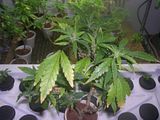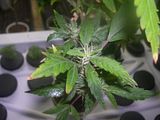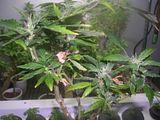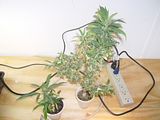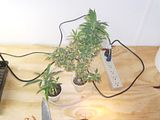-
ICMag with help from Landrace Warden and The Vault is running a NEW contest in November! You can check it here. Prizes are seeds & forum premium access. Come join in!
You are using an out of date browser. It may not display this or other websites correctly.
You should upgrade or use an alternative browser.
You should upgrade or use an alternative browser.
Genetic Drift?
- Thread starter krunchbubble
- Start date
How old are your bulbs LoudBlunts?
OMountainMix
Member
We had a True Blueberry that wouldn't stay in veg. We had to give up on it eventually. We toyed with starting some more this time, but went with High End as our blueberry related strain for the moment. Well we have Sweet Blue, too, so that makes two.
Mostly what we've seen is that we're in our second year with the same strains and my husband says that sometimes strains mature a bit and get finished sooner. This has been happening here and there, but otherwise we're good to go. Then again, we start making small amounts of clones early on in the mother's life, then keeping making bigger and bigger batches until the plant is tall, bushy, and ready to flower. We take the best and bushiest of the clones to make new mothers. We don't keep mothers around forever, b/c we find they get unmanageable for our gear and tend to get root bound and then have root rot.
I'll be keeping an eye on this thread, b/c I've never heard of this happening before. I'll ask my husband, maybe he has. He does A LOT of reading and has been growing pot for 14 years.
Mostly what we've seen is that we're in our second year with the same strains and my husband says that sometimes strains mature a bit and get finished sooner. This has been happening here and there, but otherwise we're good to go. Then again, we start making small amounts of clones early on in the mother's life, then keeping making bigger and bigger batches until the plant is tall, bushy, and ready to flower. We take the best and bushiest of the clones to make new mothers. We don't keep mothers around forever, b/c we find they get unmanageable for our gear and tend to get root bound and then have root rot.
I'll be keeping an eye on this thread, b/c I've never heard of this happening before. I'll ask my husband, maybe he has. He does A LOT of reading and has been growing pot for 14 years.
LoudBlunts
Member
How old are your bulbs LoudBlunts?
that very well may be the culprit as i've never changed



however, if this was so....why this strain and not all my strains?
that very well may be the culprit as i've never changed
however, if this was so....why this strain and not all my strains?
Genetics bro. That strain probably autoflowers as a stress response.
Glad I could help out.
LoudBlunts
Member
hmmm not saying your wrong at all....but do you have any reading material referencing frequency drop or whatever.
im not too sure i want to settle on conclusion yet.
oh yea how's this for even more complexity...
so i have inhouse/local breeder around here.....She was claiming genetics and light stress as well.
I was claiming genetics....However, i've been searching but havent heard of any white russian that started to [auto]flower (not mentioning those 'new' intended auto flower white russians from ss)
so while i kept her around, i was just trying new stuff to see what could get her reactivated or whatever...hell i dont know was just learning, observing, etc etc.
(you prolly will ask yourself what this lil paragraph has anything to do with, but bare with me)
back in the day my 9-10 mothers of all different strains would put a major dent in my nute supply...so a year or so ago, i switched up my formula...they get plain water all month long with a foilar feed of Magic Green every single week. In addition to the plain water, they do at least get nutrients for at least a whole week out that month.
wellllll since i was just experimenting on the white russian (once it started showing its ass, it was culled on the schedule)..it seemed like when i blasted her...well not exactly blasted but gave her a constant 1.0-1.3 EC worth of nutes...seemed like that would slow the flowering and the nodes wouldnt be so close together.
some of my friends say light, some say nutrients.... its gotta be one single thing. all my breeder would say was it was something from stress. this was after i told her it started growing regularly with a consistent semi high nute ratio
also... this particular strain has been culled and i have since moved on to bigger and better things...however i still have some seeds
if i do choose to start more seeds and you say this is genetic...isnt the possibility of the other seeds to do the same thing just as great?
last but not least....thanks for taking the time to freestyle and talk with me
im not too sure i want to settle on conclusion yet.
oh yea how's this for even more complexity...
so i have inhouse/local breeder around here.....She was claiming genetics and light stress as well.
I was claiming genetics....However, i've been searching but havent heard of any white russian that started to [auto]flower (not mentioning those 'new' intended auto flower white russians from ss)
so while i kept her around, i was just trying new stuff to see what could get her reactivated or whatever...hell i dont know was just learning, observing, etc etc.
(you prolly will ask yourself what this lil paragraph has anything to do with, but bare with me)
back in the day my 9-10 mothers of all different strains would put a major dent in my nute supply...so a year or so ago, i switched up my formula...they get plain water all month long with a foilar feed of Magic Green every single week. In addition to the plain water, they do at least get nutrients for at least a whole week out that month.
wellllll since i was just experimenting on the white russian (once it started showing its ass, it was culled on the schedule)..it seemed like when i blasted her...well not exactly blasted but gave her a constant 1.0-1.3 EC worth of nutes...seemed like that would slow the flowering and the nodes wouldnt be so close together.
some of my friends say light, some say nutrients.... its gotta be one single thing. all my breeder would say was it was something from stress. this was after i told her it started growing regularly with a consistent semi high nute ratio
also... this particular strain has been culled and i have since moved on to bigger and better things...however i still have some seeds
if i do choose to start more seeds and you say this is genetic...isnt the possibility of the other seeds to do the same thing just as great?
last but not least....thanks for taking the time to freestyle and talk with me
You are completely wrong. To a point of being ignorant, really. (shrug)There is no such thing as "stressful mutations", so your answer was only so much bullshit.
Mutations in plants are manipulated all the time using different stresses. Plants also undergo their own mutation as a result of stresses on adaptive mechanisms, as well as non-adaptive mechanisms. I suspect these non-adaptive mechanisms to be more responsible for a drift that may occur, since we can see one plant mutate while it's clone does not, even when they are grown in the same environments.
As far as what the OP saw, he stated it came out of nowhere. To me that is not indicative of a drift, but rather a reaction to some sort of stress. But who knows for certain? Certainly not you , Head.
It could have been the nutes as well mate. I know from past experience, especially with 24h light schedules that once fluoro bulbs start to get old plants start to flower. I posted about this like 6 years ago and an old member(Caprichioso I think) told me that my bulbs were old and that the frequency drop can be "seen" by the plants even though I couldn't with my naked eye. I changed to new bulbs and kept up with a regular schedule of changing them out(8 weeks at the most) and noticed that the auto-flowering stopped. I also dropped my light schedule from 24h to 18h. Once again I was told by an old member that the 6 hour darkness is to give the plants a rest period. I am not saying it does anything or not but I did notice the plants grew faster with a dark period. I am sorry I cannot cite any of my sources, I am not even sure if the threads are even around anymore. Hopefully this can help clarify where I am getting my info from.
We can only say what we think it could be and narrow it down to the most likely causes. Will we ever know for sure what it was? Probably not because there are so many factors to involve. The only one thing that everyone can agree on is that stress caused it...but what caused the stress? As far as why your specific plant did this, it was definitely genetic because no other strains did it. It was definitely light stress, bulbs were old, and it could more than likely also be the nutrient hit. There could have been other factors but the main ones IMHO(it's not gospel) are genetics and the light stress. I have never really heard of a plant flowering from getting too much nutrients...although I am not doubting it can happen, I've just never experienced it myself.
We can only say what we think it could be and narrow it down to the most likely causes. Will we ever know for sure what it was? Probably not because there are so many factors to involve. The only one thing that everyone can agree on is that stress caused it...but what caused the stress? As far as why your specific plant did this, it was definitely genetic because no other strains did it. It was definitely light stress, bulbs were old, and it could more than likely also be the nutrient hit. There could have been other factors but the main ones IMHO(it's not gospel) are genetics and the light stress. I have never really heard of a plant flowering from getting too much nutrients...although I am not doubting it can happen, I've just never experienced it myself.
OMountainMix
Member
New seeds might come out different. It certainly couldn't hurt to try. For instance, we kept two different female Chem Dog Double Diesels. We finally finished growing Chem #2 all the way out in three different locations, Chem #1 in two different locations. #1 is more foxtailed, heavier, and tastier. #2 has a propensity to self-pollinate and produce seeds. When I finished my #2, I thought perhaps it was become of the way I bent the plant, but it happened at the two other locations, so we now know for sure that we're going to flower out the mom in the next week or two and give away the spare clones and be done with it.
First off I never said I know that for certain... I offered the best answer based on the information given and the current state of science. I only threw the term drift in to my response because of the thread title. I suppose to be perfectly accurate I should've simply said "epigenetics", but I did not know I was gonna get nitpick trolled in this thread, and was slightly tongue in cheek.You are completely wrong. To a point of being ignorant, really. (shrug)
Mutations in plants are manipulated all the time using different stresses. Plants also undergo their own mutation as a result of stresses on adaptive mechanisms, as well as non-adaptive mechanisms. I suspect these non-adaptive mechanisms to be more responsible for a drift that may occur, since we can see one plant mutate while it's clone does not, even when they are grown in the same environments.
As far as what the OP saw, he stated it came out of nowhere. To me that is not indicative of a drift, but rather a reaction to some sort of stress. But who knows for certain? Certainly not you , Head.
You are confused about mutation vs epigenetic response. It's understandable... epigenetics is a fairly new area of study.
Don't let your personal hatred of me make you post things which show your ignorances. Mutation is not a method plants use to adapt, epigenetic response is. You're on the right track in your thinking but are confusing epigenetic changes with mutations. Actual mutations are fairly rare, and only caused by very extreme stresses like radiation exposure or chemical burn.
adaptive/non-adaptive mechanisms are epigenetic response not genetic mutation.
You are really barking up the wrong tree and making an ass of yourself.
Last edited:
Nope. You are wrong yet again. Sorry.
But, don't let me be the one to correct you. I am but a pot grower, and not a botanist.
All I know is that you are all fucked up, and think your shit doesn't stink....but then I am getting off topic....
But, don't let me be the one to correct you. I am but a pot grower, and not a botanist.
All I know is that you are all fucked up, and think your shit doesn't stink....but then I am getting off topic....
Yeah, I think we all saw you state it just like that. (shaking head and laughing at this young man)First off I never said I know that for certain... I offered the best answer based on the information given and the current state of science.
Nope. You are wrong yet again. Sorry.
But, don't let me be the one to correct you. I am but a pot grower, and not a botanist.
All I know is that you are all fucked up, and think your shit doesn't stink....but then I am getting off topic....
Yeah, I think we all saw you state it just like that. (shaking head and laughing at this young man)
I don't think my shit doesn't stink, nor do I act like I think it.
You got issues bro, and are way off topic. Keep showing your ass, as everyone with a clue knows I answered the OP's question and you offered confused misnomers.
your life might become productive if you get that chip off of your shoulder.
Last edited:
was it CX/darwin who said adaption is mutation..
Kopite
On the evolutionary scale...
Of all the random mutations which occur...
Most are detrimental and decrease the organism's chance of passing it's genes along. A few are beneficial and offer the organism some advantage. Over time the traits which are beneficial in a given environment will dominate the gene pool... adaptation.
So in the grand scheme of things mutation is the long term vehicle for evolutionary adaptation.... or adaptation is mutation.
On the scale of a single organism changing in different environments , the heritable changes are almost always epigenetic. On the small scale of a few generations of a series of clones of clones epigenetic response is the vehicle for adaptation... or epigenetic response is adaptation.
In the OP's case probabilities lean really hard toward epigenetic changes.
wow have some of us got an attitude. the rest of us are ready and willing to be open minded and learn without all the bullshit. great thread tho
rather than argue who is righter than right by virtue of their inherent rightness...
...what would be a method of deciding just exactly wtf is going on?
not saying this lands entirely in krunch's lap as a project, but it seems that this is a circumstance several folks have seen - i haven't, but if i did, i'd be interested in actually getting to the bottom of what caused it.
if one had an unaffected cutting, as well as cuts that have degenerated - what might one do to analyze the situation and gather data more specific than 'it was good, now it's shit' - seems like that's the path to figuring out wtf happened, not peckerwagging.
...what would be a method of deciding just exactly wtf is going on?
not saying this lands entirely in krunch's lap as a project, but it seems that this is a circumstance several folks have seen - i haven't, but if i did, i'd be interested in actually getting to the bottom of what caused it.
if one had an unaffected cutting, as well as cuts that have degenerated - what might one do to analyze the situation and gather data more specific than 'it was good, now it's shit' - seems like that's the path to figuring out wtf happened, not peckerwagging.
rather than argue who is righter than right by virtue of their inherent rightness...
...what would be a method of deciding just exactly wtf is going on?
not saying this lands entirely in krunch's lap as a project, but it seems that this is a circumstance several folks have seen - i haven't, but if i did, i'd be interested in actually getting to the bottom of what caused it.
if one had an unaffected cutting, as well as cuts that have degenerated - what might one do to analyze the situation and gather data more specific than 'it was good, now it's shit' - seems like that's the path to figuring out wtf happened, not peckerwagging.
One way to demonstrate the epigenetic nature of the change might be to take the unaffected cutting and the degenerated cutting from the above experiment. Get them as healthy as possible in veg and clone the top of the meristem on both. Grow both clones to mother plant size keeping them healthy in an ideal environment, and clone the top of the meristem again. repeat again.
If maintaing the 'degraded' cut in a healthy environ and only cloning the healthiest portion of the plant brings it back to the original state from the 'degradation' then it was epigenetic. If the degraded clone remains poor, then there was a mutation.
not certainly but with high probability.
not certainly but with high probability.
yah, one would think a separate 'lab grow' aside from one's typical gardening plot would be needed for the project
one thing that crossed my mind was shared circumstance, up to and including shared medium - unaffected/affected sharing a pot/rockwool block/dwc chamber - whatever - just to ensure that rootball entanglement we usually avoid. given the right 'control' to compare against, that might either rule out or advance the idea of contamination/virus/plant herpes.
do most instances of this occurring share symptoms? is it decreased yield, same yield but less potent, lowered plant vigor in general, etc, etc
probably just my nature, but i'm just not sure this is one even close to 'answers' - not even sure we've got the questions right.
well there has been some good ideas floating around in here, let me explain a little about the sour dubb, this was a relative new strain that greyskull popped from some seed, i was lucky enough to get a cut, so was zoolander, caligreen and many others, I had my mother for 2 to 3 months before i cloned another due to the old mom getting to big, all clones were good on both these moms, then on the third mom POW about 50% dudds, now greyskull and zoo all of a sudden started having the same thing happen, really dont know if they still had there origanal moms or what, but i know we all couldent have stressed our moms at the same time or over nuted or whatever. has to be genetic.
I had my mother for 2 to 3 months before i cloned another due to the old mom getting to big, all clones were good on both these moms, then on the third mom POW about 50% dudds
was it 50% that didn't root at all, or 50% of the cuttings were lacking in their veg/flower/smoking performance?
Since you are talking about clonal individuals, their effective population size (Ne) would be lower than that of sexually reproducing ones. Therefore, genetic drift can definitely be strong. Depending on its randomness and on which is the favored allele, it could lead a whole population to extinction. If in addition to drift, we take draft into account, this could magnify the loss of a clonal population (since the genome of asexual individuals is linked and acts as a whole unit). If by any chance this plants experience any type of mitotic recombination (which I am not sure if it has been reported in plants, does anyone know?) two things could happen: increase heterozygosity or loss of it. In any case, as I said before the whole genome is linked so if one of the favored alleles is favored by selection the whole genome will lose diversity.
In addition, clonal individuals are affected by Muller's ratchet. In my opinion this would be even more powerful than drift. And, if in the initial clone (the parental) there was a deleterious mutation to start with the mutation accumulation will start sooner and could drive the clonal population down faster.
The big problem with clones is (again), the linked genome. If we select for a trait that we consider "good" this trait would be linked to a bunch of other traits that could be detrimental. I would really recommend at some point crossing the plants (if possible) with a good male. This way by recombination the plant COULD get rid of deleterious mutations. Although as we know, the paradox of recombination could break down a really good individual.......
But in any case, when you see that your clones are getting worse and worse, if possible, fertilize them with a male that has good traits. This could help your population get better, increase the Ne, decrease Muller's ratchet and decrease the power of drift and draft (as Ne gets larger).
In addition, clonal individuals are affected by Muller's ratchet. In my opinion this would be even more powerful than drift. And, if in the initial clone (the parental) there was a deleterious mutation to start with the mutation accumulation will start sooner and could drive the clonal population down faster.
The big problem with clones is (again), the linked genome. If we select for a trait that we consider "good" this trait would be linked to a bunch of other traits that could be detrimental. I would really recommend at some point crossing the plants (if possible) with a good male. This way by recombination the plant COULD get rid of deleterious mutations. Although as we know, the paradox of recombination could break down a really good individual.......
But in any case, when you see that your clones are getting worse and worse, if possible, fertilize them with a male that has good traits. This could help your population get better, increase the Ne, decrease Muller's ratchet and decrease the power of drift and draft (as Ne gets larger).

